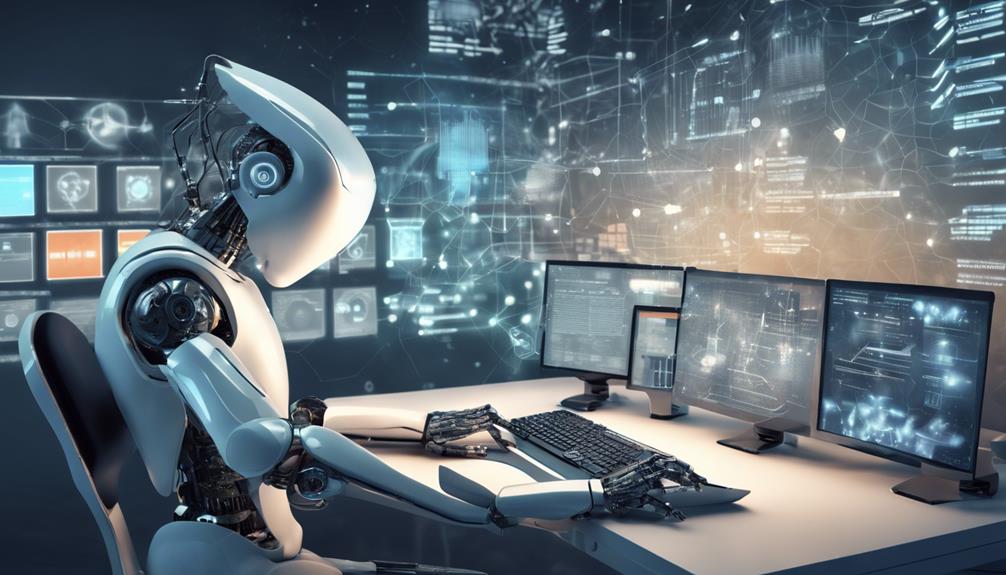As artificial intelligence advances, the field of copywriting is undergoing a significant transformation, with AI now taking on tasks that were traditionally done by human writers.
The efficiency and precision with which these AI tools generate content are remarkable, but what does this mean for the future of human creativity and the authenticity that comes from a human touch in writing?
Are we at the brink of a complete shift in how we perceive and consume written content, or is there more to this story that we are yet to uncover?
Key Takeaways
- AI tools boost content production by 300%.
- Marketers save 4-6 hours weekly with AI-generated drafts.
- AI predicts and tailors content performance to user preferences.
- AI maintains brand voice consistency efficiently.
AI's Impact on Copywriting Efficiency
In revolutionizing the landscape of copywriting efficiency, artificial intelligence (AI) has emerged as a game-changing tool for businesses and marketers alike. AI tools have significantly impacted copywriting efficiency by providing a 300% increase in content production for businesses. Marketers also benefit from AI-generated drafts, saving 4-6 hours weekly in composing compelling copy.
These tools not only enhance efficiency but also predict content performance, tailor content to user preferences, and scan for trending topics, ensuring that the produced content remains relevant and engaging.
Moreover, AI copywriting tools play a crucial role in maintaining a consistent brand voice across various content types. Brands can rely on AI tools like GPT-4 by OpenAI, Copy.ai, and Writesonic to streamline their content creation processes while adhering to their established brand identities.
Advantages of AI in Copywriting

Leveraging the capabilities of artificial intelligence (AI) in copywriting unlocks a multitude of advantages for businesses and marketers seeking to enhance their content creation processes.
Advantages of AI in Copywriting:
- Increased Content Production: AI in copywriting can boost content production by up to 300%, allowing businesses to create more quality content in less time.
- Time Savings: Marketers can save 4-6 hours per week by utilizing AI-generated drafts, freeing up time for more strategic tasks and creative endeavors.
- Personalized Content: AI tools can predict content performance and tailor it to user preferences, ensuring that the content resonates well with the target audience.
Limitations of AI in Copywriting
Artificial intelligence in the realm of copywriting encounters notable constraints that impede its ability to fully replicate the nuanced creativity and emotional depth inherent in human-generated content. While AI excels in processing vast amounts of data and producing text at scale, it falls short in several key areas. One significant limitation is the lack of emotional intelligence, hindering its capacity to establish genuine connections with audiences on an emotional level. This deficiency can impact the effectiveness of marketing campaigns and storytelling, where emotional resonance is crucial.
Moreover, AI struggles with generating truly original ideas and often requires extensive training to imitate human-like writing styles authentically. This limitation results in a lack of creativity and innovation in AI-generated content. Additionally, the reliance on outdated information and the absence of proper citations in AI output can lead to credibility issues, undermining the trustworthiness of the content. Furthermore, errors in content due to misinterpretation of data or context pose risks to the accuracy and quality of the material. Ultimately, the need for human input in programming and creativity highlights the inherent constraints of AI in producing genuinely unique and compelling copy.
AI Vs. Human Writers

As the landscape of content creation evolves, the comparison between AI and human writers surfaces as a pivotal discussion point, highlighting the contrasting strengths and limitations each brings to the realm of copywriting.
- Creativity: Human writers excel in infusing creativity into their work, crafting compelling narratives and innovative ideas that captivate audiences on a deeper level.
- Emotional Intelligence: Human writers possess the innate ability to understand and evoke complex emotions through their writing, establishing a profound connection with readers that AI tools struggle to replicate.
- Original Content: Human writers have the unique capacity to generate truly original ideas, adapting swiftly to trends and cultural shifts, ensuring that their content remains fresh, relevant, and engaging.
While AI offers efficiency and speed in content generation, human writers bring a level of creativity and emotional depth that resonates with audiences. The future of copywriting may lie in a harmonious blend of AI technology for efficiency and human creativity for crafting engaging and emotionally resonant content.
Future of AI in Copywriting
In the evolving landscape of copywriting, the integration of AI technology is poised to revolutionize the way content is created and delivered. AI in copywriting is expected to significantly enhance efficiency and reduce content creation time, leading to a more streamlined process.
Businesses that leverage AI tools have reported notable increases in content engagement and conversion rates, showcasing the effectiveness of AI in driving results. The future of AI in copywriting holds the promise of personalized content delivery, with a focus on targeted messaging to diverse audience segments.
By incorporating predictive analytics, AI can forecast content performance with impressive accuracy, enabling creators to tailor their content strategies for optimal outcomes. As AI continues to advance, we can anticipate a substantial increase in content personalization, ensuring that messages resonate with various audience segments on a deeper level.
The future of AI in copywriting is bright, promising more efficient processes, higher engagement, and better conversion rates through personalized and targeted content delivery.
Frequently Asked Questions
Will AI Replace Human Copywriters?
AI's advancement sparks debate on replacing human copywriters. While AI excels in efficiency, data analysis, and trend prediction, human writers offer emotional nuances and creativity AI lacks. The future likely entails a blend of AI technology and human ingenuity in copywriting.
Will AI Writing Replace Writers?
AI writing tools are enhancing content creation efficiencies, tailoring content to user preferences, and predicting performance. While AI evolves to mimic human styles for personalized content, it complements, rather than replaces, writers, offering a powerful ally in the writing process.
How Will AI Impact Copywriting?
AI impacts copywriting by enhancing efficiency, scalability, and personalization. It leverages data analytics to refine content strategies, predict consumer behavior, and optimize messaging. AI's role is to empower writers with insights and tools for strategic content creation.
How AI Is Changing Content Writing?
AI is transforming content writing by enhancing efficiency and personalization. From analyzing data to generating creative text, AI tools like GPT-4 and Copy.ai are revolutionizing content creation. Businesses benefit from faster, data-driven insights and tailored content.
Conclusion
In the ever-evolving landscape of copywriting, AI stands as a powerful symbol of efficiency and innovation.
While AI tools offer speed and accuracy in content creation, they also raise concerns about the human touch and ethical considerations.
As we navigate the future of AI in copywriting, it is crucial to strike a balance between harnessing its capabilities and preserving the artistry and emotional nuances that only human writers can provide.









